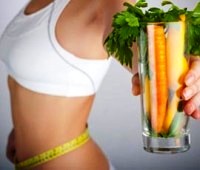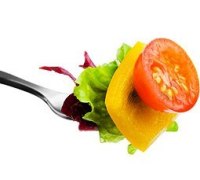Detox has earned a bad rap because too many diets call for fasting and deprivation. Here's a healthier, less stressful way to clean up bad eating habits.
By SHAPE MAGAZINE
What is detox?
Detox is a process that helps rid the body of harmful toxin build-up and although our bodies are designed to deal with toxins and physical strains like stress, poor nutrition, alcohol, lack of exercise and environmental pollution, there are times when they're simply overloaded.
That's the time to take a break, slow down and fill up on quiet time, good nourishing food and gentle exercise.
By detoxing you are, in effect, rebuilding and strengthening your detoxifying organs, which should then help you gain more energy, clear your skin, improve digestion and strengthen your immune system against infections or illness.
The liver is our most effective cleansing organ — it receives 2.268 litres of blood per minute — but when our body is overloaded with junk, it's the first to take a hit.
Skin, the body's largest organ, plays an important role in detoxing by sweating out urea and other waste products. It is also a barometer of health and the first area to show signs of improvement. Water, plenty of fresh fruit and vegetables, flaxseeds and pumpkin seeds, fatty acid supplements, gingko and antioxidant supplements are all beneficial to the skin.
Doctors sometimes recommend sauna treatments and exercise to increase sweat production, thereby aiding detoxification.
You know it's time to detox when you suffer:
-
Headaches
-
Dizziness, fatigue, light headedness, sugar cravings
-
Frequent mood changes such as depression, forgetfulness and lack of concentration
-
Bloatedness, nausea, poor digestion, constipation or irregular bowel activity
-
Intolerance towards fatty foods and alcohol
-
Excessive sweating and unpleasant body odour
-
Worsening or onset of hay fever, asthma or skin rashes
- Raised blood pressure or fluid retention
During detox, increase:
-
Water consumption, at least 1.5 litres of fluid a day (but also don't overdo it - too much water can be dangerous)
-
Fresh fruit (listed below) and juice
-
Vegetables: preferably raw, steamed or juiced (listed below)
-
Nuts, seeds and pulses
-
Fresh fish, preferably grilled or baked
-
Brown rice and rice products, wholewheat bread
-
Garlic and herbal teas like ginger, peppermint and thyme
- Sprouts — the vitamin and nutrient content of pulses increases when sprouted. They are some of the most nutritious and inexpensive foods you can eat. Mung beans, lentils, chickpeas, adzuki, sesame, barley, soya beans and linseeds can all be sprouted at home.
During detox, avoid:
-
Dairy products
-
Red meat
-
Processed or convenience foods
-
Tea, coffee, alcohol — they dehydrate
-
Sweets and chocolates
-
Smoking (or try to cut down at least) and avoid smoky environments
-
Food containing preservatives, colorants and sugar
-
Bread, wheat, biscuits, cereals
-
Salt — use organic herb and spicy herb seasoning like A. Vogel, Bioforce Herbamare and Trocomare or Kelpamare, as a salt substitute
- Sweet, carbonated drinks
After detox you should feel or have:
-
More energy
-
Fewer allergic reactions
-
Better quality sleep
-
Healthier skin
-
Fewer mood swings
-
Normal bowel movements
-
A clearer mind
- Fewer and shorter infections
What about fat?
Fats are important when detoxing (and for overall good health) but choose polyunsaturated, omega-3 fats (flaxseed, soyabean, canola and fish oils) and omega-6 from seeds and nuts — they play a supporting role by strengthening your immune system, preventing food cravings, keeping blood sugar levels steady, combating fatigue and depression and keeping your skin soft and youthful.
Up your intake of omega-3s by eating oily fish twice a week. Use flaxseed oil in dressings and add seeds and nuts to salads.
The good guys
Grains
Brown rice, quinoa, millet, buckwheat — including their flours, flakes and egg- free pasta — rice cakes, crackers and puffed-rice cereal.
Fruits 2-3 servings a day
Apples — help reduce cholesterol and are high in fibre.
Grapes — rich in potassium and slow the release of sugar.
Pears — rich in fibre, vitamin C, potassium.
Papaya and pineapple — contain enzymes that aid digestion.
Apricots and peaches — rich in beta-carotene, which is converted into vitamin A in our bodies. This is essential for the liver when detoxing.
Berries — blackberries, raspberries, blueberries and strawberries are rich in fibre and antioxidants.
Grapefruit — lessens detox reactions. Warning: grapefruit juice contains naringin, a citrus flavonoid that can interfere with certain medication so first check with your doctor if you are taking medication.
Kiwi fruit — rich in vitamin C. The skin is also a good source of antioxidants.
Watermelon — packed with vitamins A, B6 and C, it helps detox by increasing the flow of urine out of your system.
Vegetables
Beetroot and carrots — relieve wind and heartburn, contain plenty of antioxidants and help liver function.
Celery — increases production of urine, which aids in detoxing and helps reduce blood pressure.
Alfalfa — acts as a laxative, improves flow of urine and is a fantastic source of nutrients (avoid if you have lupus or auto-immune problems).
Globe artichokes — improve urine flow, aid liver function and help reduce cholesterol. Also helps improve unpleasant body and breath odours.
Cabbage family — includes broccoli, turnips, mustard greens, radish, Brussels sprouts, Chinese greens and cabbage. Rich in antioxidants. The nutrients are most abundant when eaten raw or juiced.
Garlic, leeks and onions — boost liver function and the immune system, and help reduce cholesterol.
Parsley — freshens breath, contains antioxidants, is a diuretic and blood purifier.
Detox your detoxifying organs
Use organic, in season, thoroughly washed fresh fruit and vegetables.
Spinach = liver
Spinach is high in antioxidants, vitamin C, vitamin A (beta-carotene) and folic acid. The juice is packed with minerals and works well as a cleansing blood tonic, and guards against constipation by keeping the colon and small intestine healthy.
A word of warning — arthritis sufferers and those with liver disease should not use the juice and only eat spinach sparingly.
Short order
-
Heat a little sliced garlic in a pan with a couple of spoonfuls of water and olive oil. Add Rosa tomatoes and cook till they start to burst. Toss in spinach to wilt slightly and serve with lightly steamed fish or chicken.
-
Stuff a chicken breast with spinach mixed with olive oil, orange peel and sesame seeds. Simmer chicken in stock flavoured with orange juice, ginger, garlic and a little soya sauce… Oriental coq au vin a la detox!
- Wrap a salmon or chicken fillet in a few spinach leaves and steam each parcel in vegetable stock. Serve with a tomato juice-based dressing.
Peaches = kidneys
Boost kidneys by drinking lots of fluids (water and herbal teas) and loading up on fresh fruit and vegetables. You can give them a bit of extra help in the form of parsley, cranberries and celery seeds.
Short order
-
Toss smoked salmon or mackerel with butter lettuce and rocket leaves and top with ripe peach slices.
-
Poach 4 whole peaches in 2 C (500 ml) orange juice, 1/2 C (125 ml) water, 2 T (30 ml) honey, 2 star anise, 1 T (15 ml) lemon juice till tender — about 20 mins. Reduce sauce to thicken if desired.
- Make a salad using fresh peach wedges, goat’s cheese and walnuts.
Papaya = stomach
Papaya, the species name for pawpaw, is rich in chymopapain, an enzyme that breaks down protein. The fruit is known as a pain reliever, good for back pain and inflammation. It is an alkaline fruit so helps to relieve heartburn, aids digestion and is useful in the treatment of ulcers.
Papaya breaks down unwanted substances, including uric and toxic acids in the body. The peppery seeds may also be eaten in small quantities to aid digestion.
Short order
-
Add papaya to fruit salads, breakfast cereals and smoothies.
-
Make a fresh papaya salsa to dollop onto grilled fish, chicken or meat. Mix 2 C seeded and finely diced papaya, 1—2 thinly sliced red chillies, 1—2 cloves crushed garlic, 1 heaped t (7 ml) very finely chopped lemon grass, 1/2 — 1 t (5 ml) minced or fresh ginger, 2 T (30 ml) fish sauce, 1 t (5 ml) brown sugar, the juice of 1 small lemon or lime and a large handful chopped fresh coriander.
- Make a dressing using plain yoghurt, fat-free milk or water, salt, milled pepper and curry paste. Drizzle over a salad of leaves, sliced papaya and shredded chicken.
Tomatoes = skin
Tomatoes packed with vitamins C, E and A, most of which is in the jelly-like pulp around the seeds. The juice has antiseptic properties making it valuable in treating hepatitis and cirrhosis, and also as a good skin toner. Tomatoes are, of course, packed with the antioxidant lycopene.
The lycopene content is enhanced and more easily absorbed when heated, so make a point of buying canned tomatoes and tomato sauce. Tomatoes are high in lignin, an insoluble fibre good for lowering cholesterol levels and protecting against colon cancer.
Short order
-
Use ripe juicy tomatoes to make a detox-style gazpacho, but remember to avoid stock and preservative-packed condiments. Chop 6 large ripe tomatoes, 1/2 English cucumber, 2 red or yellow peppers, 1 small red or white onion, 2 garlic cloves, 1/4 C (60 ml) parsley. Place in a blender with 2 T (30 ml) lemon juice, 21/2 C (750 ml) tomato juice, 11/2 C (375 ml) water. Blend to desired consistency, add a few drops Tabasco sauce to taste or season with Broodmare salt substitute. Serve well chilled.
-
Make a dressing with homemade or store-bought tomato juice, chopped herbs such as parsley, chives or basil, garlic, lemon juice and a dash of lemon. Drizzle over avocado and mixed leaf salads.
- Slow roast baby tomatoes in the oven and toss into couscous or grains, over pasta or into salads.
Detox warning
If you are menstruating, pregnant, on medication, breast-feeding or have any medical problems, consult your doctor before embarking on any detox or cleansing plan.
(Shape magazine, updated April 2011)
DISCLAIMER: Please note that Health24 recommends long-term changes in eating and drinking habits, instead of quick fixes, to ensure a balanced diet and lifestyle all year round.
For more info on healthy living, visit www.shapemag.co.za.




 Publications
Publications
 Partners
Partners













